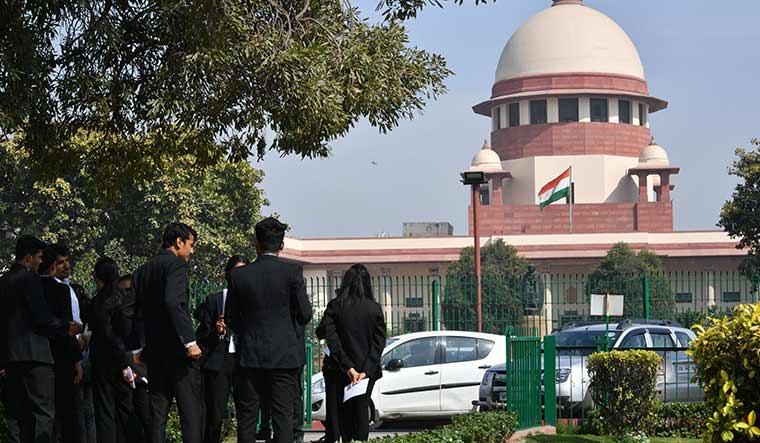Three new criminal laws came into effect in the country on Monday, a move decried by the Opposition parties as 'bulldozer justice'.
The Bharatiya Nyaya Sanhita (BNS), Bharatiya Nagarik Suraksha Sanhita (BNSS) and the Bharatiya Sakshya Adhiniyam (BSA) will replace the British-era Indian Penal Code, Code of Criminal Procedure and the Indian Evidence Act, respectively, from Monday.
Incidentally, the first case under provisions of the Bharatiya Nyaya Sanhita was against a street vendor in the Kamala Market area for enchroachment.
The FIR was registered under Section 285 of the BNS which states, "Whoever, by doing any act, or by omitting to take order with any property in his possession or under his charge, causes danger, obstruction or injury to any person in any public way or public line of navigation, shall be punished with fine which may extend to Rs 5,000."
The police said an incident was reported at 12:15 am against a street vendor, who allegedly obstructed a public way to sell goods at a foot overbridge near the New Delhi station. After instructions to move went unheeded, a patrol officer registered a case at 1:30 am.
Union Home Minister Amit Shah, who piloted the laws, said the new laws intend to providing justice, unlike the colonial-era laws that gave prioritised penal action. "These laws are made by Indians, for Indians and by an Indian Parliament and marks the end of colonial criminal justice laws," he had said.
Shah had further said the laws were not just about changing the nomenclature but bringing about a complete overhaul. "Soul, body and spirit" of the new laws is Indian," he had said.
Though official sources claim the new laws will address some of the current social realities and crimes and provide a mechanism to effectively deal with these, legal luminaries believe the new laws will pose big challenges ahead for law-enforcing agencies, judicial officers, and legal professionals.
However, the opposition has targetted the government for the "forceful" implementation of the law. Congress president Mallikarjun Kharge on Monday said the new criminal laws were passed "forcibly" after suspending 146 MPs in the last Lok Sabha. He asserted that the INDIA bloc would not allow such "bulldozer justice" to prevail in the country's parliamentary system.
In a post in Hindi on X, Kharge said, "After the political and moral shock in the elections, Modi ji and the BJP are pretending to respect the Constitution, but the truth is that the three laws of the criminal justice system which are being implemented from today, were passed forcibly after suspension of 146 MPs."
"INDIA will no longer allow this 'bulldozer justice' to prevail in the parliamentary system," he asserted.
The Congress is also likely to raise the issue during the current Parliament session. Congress MP Manish Tewari moves adjournment motion on new criminal laws seeking discussion over the three new criminal laws kicking in today. He sent a notice ahead of the Lok Sabha sitting at 11 am this morning.
Congress leader and former Finance Minister Chidambaram said "90-99 per cent of the so-called new laws were a cut, copy and paste job."
"A task that could have been completed with a few amendments to the existing three laws has been turned into a wasteful exercise. "Yes, there are a few improvements in the new laws and we have welcomed them. They could have been introduced as amendments. On the other hand, there are several retrograde provisions. Some changes are prima facie unconstitutional," he said.
He also accused the government of not rebutting or answering any of the criticism. "MPs who were members of the standing committee pored over the provisions and wrote detailed dissent notes to the three bills," the senior leader said. "Law scholars, bar associations, judges and lawyers have in numerous articles and seminars pointed out the grave deficiencies in the three new laws. No one in government has cared to answer the questions," he said.
"It is another case of bulldozing three existing laws and replace them with three new Bills without adequate discussion and debate," Chidambaram said.
The initial impact will be to throw the administration of criminal justice into disarray, he said. "In the medium term, numerous challenges to the laws will be instituted in various courts. In the long term, further changes must be made to the three laws to bring them in conformity with the Constitution and the modern principles of criminal jurisprudence," Chidambaram said.


